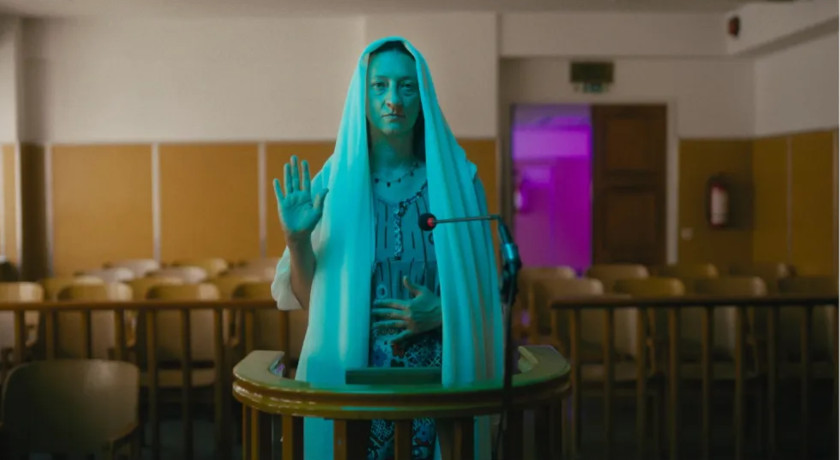Vassilis Kroustallis reviews the Greek documentary 'Stray Bodies' by Elina Psykou.
At the beginning of Elina Psykou's powerfully experiential documentary, 'Stray Bodies', the various women participants are asked to reply to a free association game; a word heard invokes a word told. 'Europe' and 'European Union' (both of those terms are used as different entries) are asked of all participants. The questions are varied, as the EU policy on life and death ethical issues is.
'Stray Bodies' is a travelogue between three different EU countries (Malta, Italy, Greece) and Switzerland; screening at the recent Thessaloniki Documentary Festival, it managed to invoke the ire of the local Eastern Orthodox Church for its poster of a topless woman on the Cross (and the festival immediately replied that there's nothing non-Christian with the poster [link in Greek] ).
In many ways, 'Stray Bodies' feels like its tormented heroes, and Psykou knows how to evoke silent anxiety and mourning out of her subjects (she did it successfully in her 2017 fiction film, 'Son of Sophia'). Robin is pregnant, but Malta has one of the severest anti-abortion laws in the EU; she then needs to travel to Sicily and Italy to have an abortion (in the film, a reenactment of the original events takes place because of potential retribution concerns). Kiki Tsakiri, a radiant Greek administrative officer, is paralyzed by ALS and wants to die with dignity. She cannot do it in Greece (she died in 2022). Yet Psykou's film follows a different case of assisted suicide in Switzerland -and talks to doctors and practitioners, witnessing the procedure on camera.
On the other side of the spectrum, a 40-year-old woman from Italy needs to come to Greece to have her child via IVF, since the Greek law is one of the most relaxed in the EU on this (permitting even temporary residents to use one of the fertilization clinics). We spend time with her and her expected anxiety, but also her talking with her parents about the baby's future name.
Psykou doesn't spend much time on her individual cases' backgrounds and does wisely not offer explanations and motivations for what we already see on the big screen. It's all about bodies, not minds, in her film -which still manages to showcase her subjects singing (our favorite being the 'Papa Don't Preach' rendition addressed to the pro-life Malta supporters). Sometimes, her images speak for themselves, like the so-called 'Garden of never-born children' in Malta (the abortion embryos). At other times, we do get the other side of things (the anti-abortionist story, the anti-euthanasia stance) as objectively as we can. And 'Stray Bodies' lets the intricate threads of all its separate stories weave into each other, even in a contradictory manner, without any palpable resolution. Like, for instance, when the assisted suicide physician tries to defend assisted suicide by appealing to abortion laws, describing the latter process in a very harsh light. Mending the divergent ethical worries into a coherent (and perhaps faux) facade is understandably not Psykou's worry here; still, the film would have benefited from a more expert discussion on IVF legislation or euthanasia concerns. Bodies are present, and dissenters' voices are present, but sometimes experts (jurists, philosophers) are also needed but not around.
'Stray Bodies' is an engrossing film that studies the traveling of bodies rather than their ultimate fate; a most pertinent shot is one of the Greek Anastasia Kontou (who lost her mother to brain cancer) posing herself in the airport's luggage reclaim, ready to be transported (as a suitcase) to Switzerland to witness an assistant suicide procedure. It lets things happen, and it feels dramatically more than the sum of its parts, reiterating the question of a refugee woman's body in the sea of EU rules.
'Stray Bodies' had its world premiere as part of the 2024 Thessaloniki Documentary Festival.
Vassilis Kroustallis


